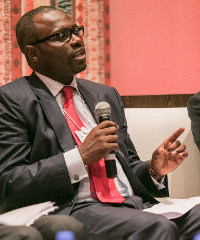China, US both rivals and partners for slices of African pie
Last week’s US-Africa Leaders Summit revived debate on America’s efforts to catch up with China’s growing economic influence in Africa. The summit generated about US$37bn in deals, investment and financial support for Africa and as General Electric (GE) CEO Jeff Immelt put it, the US is “back in the game”.
In Beijing local media reported that the US is now “seemingly following in China’s footsteps” to seriously engage Africa. Trade between China and Africa has increased exponentially from $10bn in 2000 to over $200bn in 2013. China’s increasing interest in Africa is felt across the continent with its involvement in massive infrastructure projects including construction of roads, ports, airports, railway lines and dams.
In a report titled Africa and the United States: A defining relationship of the 21st century, US and African business leaders expressed their thoughts on the increasing investments in Africa from two of the world’s superpowers. The report by investment firm Investec Asset Management and the US Chamber of Commerce, highlights the renewed interest in Africa from the US in light of similar efforts by other major players from across the globe such as China.
While US-China interest in Africa is often viewed as competition, Mimi Alemayehou, executive advisor and chair of Blackstone Africa Infrastructure, notes that it is more relevant to look at the two countries as complementary forces on the continent. And Kola Karim, CEO of Nigerian company Shoreline Energy International, states that China’s approach of “business dialogue” as opposed to “aid discussions” has put it ahead of the US in getting relations with Africa right.
At the centre of the US versus China dynamic in Africa is the different approach they take in engaging with the continent. Fred Hochberg, chairman of US Export-Import Bank, notes that while China’s focus is extractive industries and primarily gaining access to natural resources, the US companies play differently selling products and services instead.
Jay Ireland, president and CEO of GE Africa, argues that he chooses not to view things from the “US versus China” standpoint. Ireland notes that in infrastructure China has offered Africa solutions from financing to actual construction. He adds that US companies should take a similar approach of offering wholesome solutions in implementing projects.
“The question is: can we compete and provide the solution technically, financially, operationally and more? If we put together a good package, we’ll win our fair share. So, we at GE are focused on bringing the full solution and using aspects of the US government – Ex-Im, OPIC, USTDA, all of which can be very helpful,” says Ireland.
Although often viewed as geopolitical rivals, US and China have also partnered on projects in Africa and elsewhere. For instance, US giant GE has investments in 160 countries globally including China, and has worked with Chinese companies which bring in GE equipment for projects in Africa and around the world.
In Ghana a Chinese company was awarded the contract to build a highway as part of a key US government initiative in Africa called Millennium Challenge Corporation (MCC). In Mali a Chinese firm was contracted to expand the Bamako Airport, a project funded under MMC to the tune of $71.6m.
However, the increasing involvement in Africa is not a monopoly of the US and China. The European Union, Japan, Brazil and India have also increased economic ties with Africa.
According to Donald Gips, a former US ambassador to South Africa, the investment opportunities in Africa are large enough for all interested partners. Citing the example of America’s private sector and NGO-led strategy versus China’s government-led strategy, Gips argues that Africa should take advantage of the different approaches each partner uses to engage with the continent. “Africa should take advantage of the more state-driven approaches of China and the more entrepreneurial energy of the US.”
Experts believe the competition for Africa will work well for the continent offering it a wide range of benefits. “It means there will be more competition for the best goods, services and engagement strategy that will benefit the continent and its people,” adds Alemayehou.
However, Shoreline Energy’s Karim reckons that Africa, often divided by the unique needs of its 54 nations, needs to be more united to have stronger negotiating power. Africa should also learn from the Chinese and do its due diligence, be better prepared during negotiations and have mechanisms in place to deliver on its commitments.


